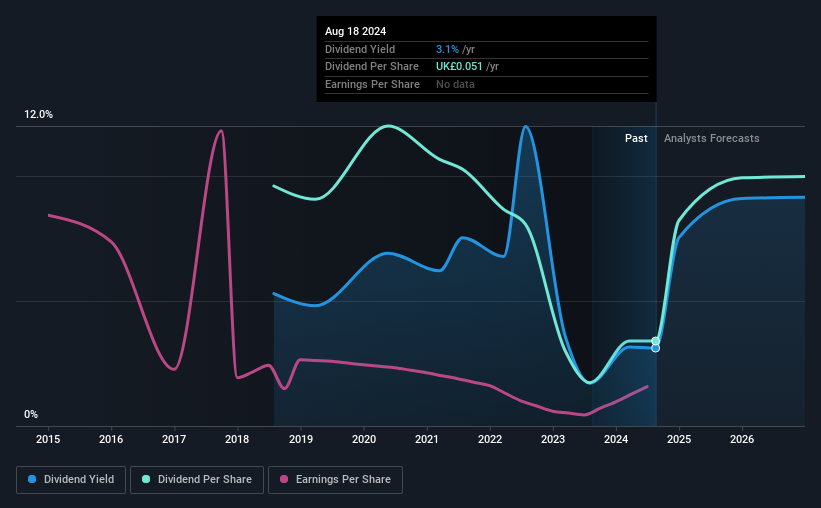- United Kingdom
- /
- Insurance
- /
- LSE:SBRE
Don't Race Out To Buy Sabre Insurance Group plc (LON:SBRE) Just Because It's Going Ex-Dividend

It looks like Sabre Insurance Group plc (LON:SBRE) is about to go ex-dividend in the next 3 days. The ex-dividend date occurs one day before the record date which is the day on which shareholders need to be on the company's books in order to receive a dividend. The ex-dividend date is important because any transaction on a stock needs to have been settled before the record date in order to be eligible for a dividend. Meaning, you will need to purchase Sabre Insurance Group's shares before the 22nd of August to receive the dividend, which will be paid on the 25th of September.
The company's next dividend payment will be UK£0.017 per share. Last year, in total, the company distributed UK£0.051 to shareholders. Calculating the last year's worth of payments shows that Sabre Insurance Group has a trailing yield of 3.1% on the current share price of UK£1.636. Dividends are an important source of income to many shareholders, but the health of the business is crucial to maintaining those dividends. So we need to check whether the dividend payments are covered, and if earnings are growing.
View our latest analysis for Sabre Insurance Group
Dividends are typically paid from company earnings. If a company pays more in dividends than it earned in profit, then the dividend could be unsustainable. Sabre Insurance Group paid out more than half (50%) of its earnings last year, which is a regular payout ratio for most companies.
Generally speaking, the lower a company's payout ratios, the more resilient its dividend usually is.
Click here to see the company's payout ratio, plus analyst estimates of its future dividends.

Have Earnings And Dividends Been Growing?
When earnings decline, dividend companies become much harder to analyse and own safely. If earnings decline and the company is forced to cut its dividend, investors could watch the value of their investment go up in smoke. Sabre Insurance Group's earnings per share have fallen at approximately 9.9% a year over the previous five years. When earnings per share fall, the maximum amount of dividends that can be paid also falls.
The main way most investors will assess a company's dividend prospects is by checking the historical rate of dividend growth. Sabre Insurance Group's dividend payments per share have declined at 16% per year on average over the past six years, which is uninspiring. While it's not great that earnings and dividends per share have fallen in recent years, we're encouraged by the fact that management has trimmed the dividend rather than risk over-committing the company in a risky attempt to maintain yields to shareholders.
The Bottom Line
Should investors buy Sabre Insurance Group for the upcoming dividend? We're not overly enthused to see Sabre Insurance Group's earnings in retreat at the same time as the company is paying out more than half of its earnings as dividends to shareholders. These characteristics don't generally lead to outstanding dividend performance, and investors may not be happy with the results of owning this stock for its dividend.
So if you're still interested in Sabre Insurance Group despite it's poor dividend qualities, you should be well informed on some of the risks facing this stock. For example, we've found 2 warning signs for Sabre Insurance Group that we recommend you consider before investing in the business.
If you're in the market for strong dividend payers, we recommend checking our selection of top dividend stocks.
New: Manage All Your Stock Portfolios in One Place
We've created the ultimate portfolio companion for stock investors, and it's free.
• Connect an unlimited number of Portfolios and see your total in one currency
• Be alerted to new Warning Signs or Risks via email or mobile
• Track the Fair Value of your stocks
Have feedback on this article? Concerned about the content? Get in touch with us directly. Alternatively, email editorial-team (at) simplywallst.com.
This article by Simply Wall St is general in nature. We provide commentary based on historical data and analyst forecasts only using an unbiased methodology and our articles are not intended to be financial advice. It does not constitute a recommendation to buy or sell any stock, and does not take account of your objectives, or your financial situation. We aim to bring you long-term focused analysis driven by fundamental data. Note that our analysis may not factor in the latest price-sensitive company announcements or qualitative material. Simply Wall St has no position in any stocks mentioned.
About LSE:SBRE
Sabre Insurance Group
Through its subsidiaries, engages in the writing of general insurance for motor vehicles in the United Kingdom.
Excellent balance sheet and good value.
Market Insights
Community Narratives




